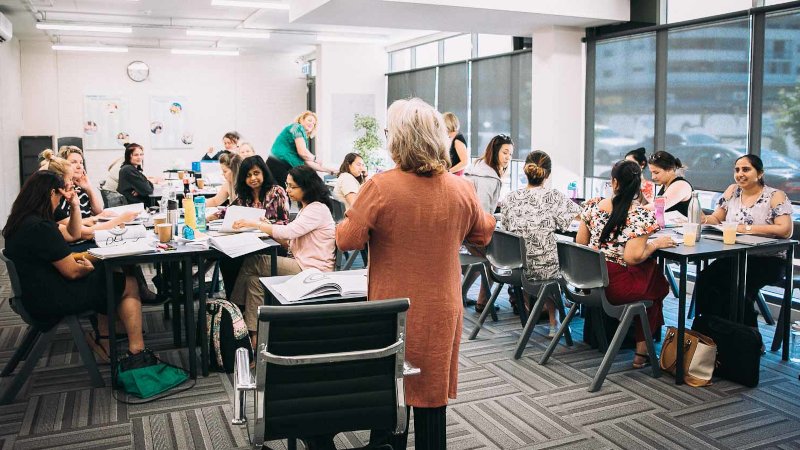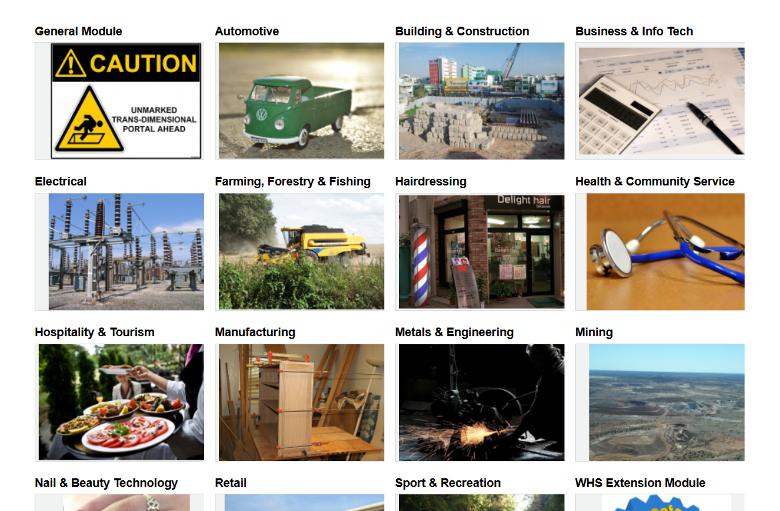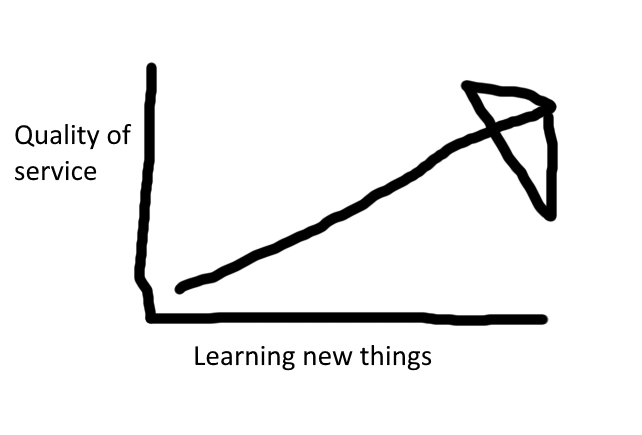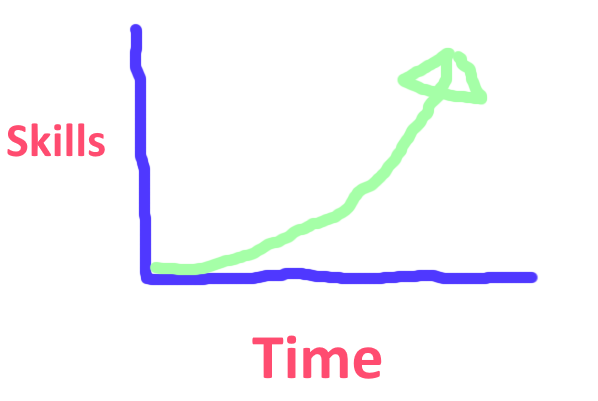
ITAC students studying the Teacher Aide Combo.
Teacher aides in Australia are generally required to obtain a nationally recognised qualification or certificate such as the CHC30221 Certificate III in School Based Education Support or the higher level CHC40221 Certificate IV in School Based Education Support before being employed in a school.

ITAC students studying the Teacher Aide Combo.
This article will summarise the learning opportunities available for teacher’s aides in Australia and includes qualifications, certificates and short courses for teacher aides.
If you are actively looking for work or are already employed, we recommend that you complete regular courses, certificates and at least one qualification if you have not done so already. It is important to continually improve your skills and knowledge so you can provide a high level of service to your school and your students. You will also read about what is available in Australia at present, what it costs and why you should invest your time and money in your own education.
To become a teacher’s aide in Australia, you will need to complete a qualification and obtain a certificate such as the CHC40221 Certificate IV in School Based Education Support. You also need to have certain skills to become a good teacher’s aide – some of these are taught in your course and some require experience to master.
We did the research, spoke with the experts and have come up with 6 certificates, qualifications and skills that you need to boost your resume so you can be the best teacher aide your school has ever seen!
Note that there is currently no 'legal' requirement in any state or territory for a teacher aide to hold a teacher’s aide qualification or certificate (at least yet – but there has been talk). However, it should be pointed out that very few schools will hire someone without an education support qualification or certificate.
If you want to become a teacher aide, we also recommend that you read this free article: How to become a teacher aide.
If you’re just starting out in the industry, you may have heard that you technically don’t need a teacher’s aide qualification or certificate to get hired by a school. In fact, you may have already done some paid work as a casual or relief support worker. This is not uncommon, but unless you are (really good) friends with a principal (and even then...), you will need a nationally recognised qualification to get your foot in the door.
There is much more to working as a teacher’s aide than you may think – helping children one-on-one for example is more complicated when you are trying to teach to ‘conceptual understanding’ as opposed to simply teaching to ‘task completion’.
You will also need to develop your pedagogical skills and knowledge by learning best practice teaching and learning strategies such as modelling, worked examples, scaffolding, metacognitive skills, reading and writing strategies, play based learning and enquiry/discovery based approaches, and dozens more!
Not only that, but you will also need to learn about behaviour management techniques, working with students with disabilities and disorders, and operational and logistical processes and policies. Wow so much to learn!
Even if you are already working in a school, a qualification is still essential and vital for both your job security and also so you can provide the highest level of support services to the classroom teacher and your students. There are several other reasons for why a nationally recognised course is essential:

ITAC students learn a range of research-based skills.
Also, you should bear in mind that if you don’t have a qualification and your contract ends, it is possible that another person who is qualified could be awarded the position the following year. As time goes on, schools are requiring their staff to be more and more qualified depending on their role. We don't recommend waiting until you are out of work to test this theory.
There are two main qualifications that the majority of teacher’s aides in Australia complete before being appointed by a school:
So the next question that many ask is what's the difference? The CHC30221 Certificate III in School Based Education Support is the entry-level course that covers all of the basics of working in a mainstream classroom the under direct supervision of a teacher.
The CHC40221 Certificate IV in School Based Education Support on the other hand covers all of the basics as well as introduces you to working with special needs students such as students with autism. We recommend the CHC40221 Certificate IV in School Based Education Support (or our popular Teacher Aide Combo) given that most work in schools involves supporting special needs students.
Note that to work in a special need's school, which often attracts slightly higher pay, you typically need the CHC40221 Certificate IV in School Based Education Support - it is known as the special need’s qualification. Having this certificate on your resume will significantly increase your chances of landing your ideal job in a local school - even if you do not plan on working with students with disabilities or disorders.
While we are talking about courses, be sure to choose the right provider for you.
There are a range of free online certificates or courses for teacher aides that you could easily complete and add to your resume (ITAC even offer some). You can sign up online and work though them at a pace that suits you, although they are generally designed to be completed in one go. These are great for boosting your resume and is a good way to go about learning more without spending money on expensive books or courses.
How do you find these courses? First choose a topic and then search the web - you might search 'Autism online course' for example. It may take some time to find a course that interests you, but there are plenty out there. While most courses are free - some you will have to pay for, however the small cost is more than worth it in most cases.
This is a very popular, relatively simple and free short course developed and provided by the government. It takes about half an hour to complete.

Free short courses available from WorkSafe WA’s website.
How do these free courses work? Generally, you will be required to log in, read some information, watch a video or two, answer some questions and then download your certificate.
Note: Free certificates generally don’t come with support - it is free after all.
And what are you to do with all of these certificates? Keep them stored in a folder on your computer e.g. 'Certificates', and label each certificate using the same format e.g 'Jan-2020 Autism certificate' This is important because many TAs end up completing dozens of certificates over their career, so it's worth having them neatly labelled from the beginning.
Important tip: Most education departments offer free short courses to staff which can be accessed online. When you start working in a school, ask your supervisor about this and try to do a short course every month or so.
PDs (short for professional development) are usually not free. They range in price from free to $200 (average), right up to $1200+ for a 2-day conference. These can sometimes be called workshops, seminars etc. and entail face to face attendance (virtual attendance is becoming more popular however).
Sometimes you can find PDs on Google, but generally speaking the only way to learn of PDs is via your school. Ask your school (teacher, Principal, Head of Learning Area, fellow teacher aides etc.) to forward any upcoming PDs to you as PD organisers often email schools.
School staff attend 1-4 PDs per year on average (this is an average – some attend more – some none at all). Typically, a PD is run over a full day (although sometimes for an afternoon or even just an hour) and people from schools in the local area are invited to attend.

The more you learn, the higher the quality of service you will be capable of providing.
An important, free and often overlooked way to improve is to develop your skills and knowledge through real world practice. Improvement comes with experience, but it takes a really long time. Actively and purposefully trying to get better at something is a way of fast-forwarding this process. The 2 main ways that you can easily and cheaply improve your work-related skills is via reflective practice, and coaching and mentoring:
Anyone who stops learning is old, whether at twenty or eighty.” — Henry Ford
Some people complete their course and then think that they don’t need to learn anything else or that the learning is now done and dusted. Nothing can be further from the truth especially in the education sector. Finishing your course is just the beginning of your journey. Completing a course only means that you now know the bare minimum – you are known as a 'new-entrant' (aka a rookie).
How can you continue your learning after finishing your course?

The acquisition of skills & knowledge is not linear (straight) but exponential (time is constant but learning gets easier and faster).
As you can see from the very ‘scientific’ graph above, the more you learn, the easier learning becomes as you add and build on your existing knowledge. As you get better at something, mastering new but related skills becomes easier. To use 'teacher speak' you are adding to your existing schema (a schema is the way we organise information in our minds about a specific topic).
Incremental learning is all about getting slightly better at something one tiny bit at a time. That can mean learning or improving, even if just a little, each day or week. Imagine for example, that you read this article and learnt one or two new things that made you a tiny bit better at your job. Now imagine if you repeated that process every week for 5 years - that’s about 260 tiny improvements that in their totality result in a very competent teacher aide.
That is the power of incremental learning – it doesn’t take much on each occasion – but it adds up over time. These small incremental improvements are compounded (in a good way) when you add in books, videos, PDs, short courses, reflective practice, deliberate practice and one or more nationally recognised qualification. Then, the more you know, the easier you learn new things (the easier it is for your brain to add new information to your existing schema).
If you are looking to work as a teacher aide in the future, the first step is to ensure that you enrol with a reputable provider so you get a foundational understanding of the most effective teaching and learning strategies.
In addition, you should also take the time to learn and improve your skills and knowledge by attending PDs and short courses, reading widely and watching videos online. It is important to take advantage of the power of incremental learning and combining it with reflective practice.
This will enable you to provide the best possible service to your students, your teacher and families who put their trust in you. It will also give you a range of content to add to your resume and to discuss during job interviews.